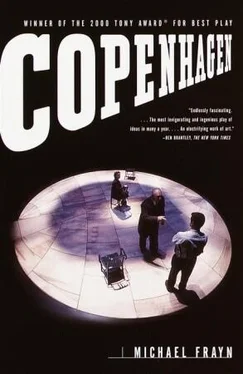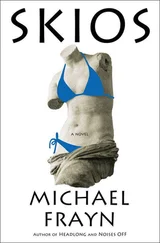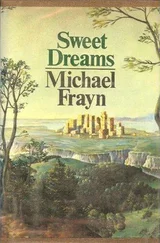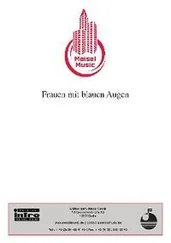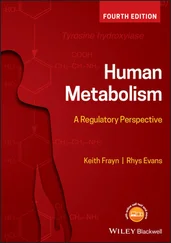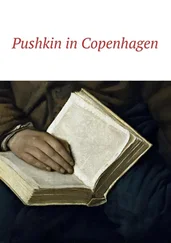There was always something a little sharp and harsh about him, something that at its best inspired respect rather than love, and that after the war occasioned really quite astonishing hostility and contempt. Even Samuel Goudsmit turned against him. Goudsmit was an old friend and colleague; when the investigators of the Alsos mission, the Allied agency for gathering intelligence on German atomic research, for which he was working, finally broke into Heisenberg’s office in 1945, one of the first things they saw was a picture of the two of them together that Heisenberg had kept there as a memento of happier days. But when Goudsmit subsequently interrogated Heisenberg he found him arrogant and self-involved. Goudsmit had understandably bitter feelings at the time — he had just discovered the record of his parents’ death in Auschwitz. Heisenberg was also caught in a false position. Confident that his team had been far ahead of the Americans, he offered Goudsmit his services in initiating them into the secrets of uranium fission. (Goudsmit did nothing to correct his misapprehension, which gave Heisenberg, when the truth finally came out, grounds for returning Goudsmit’s bitterness.) In his superficial and strangely unimpressive book on Alsos, Goudsmit wrote about Heisenberg and his team with contemptuous dismissal, and in the year-long correspondence in the American press that followed its publication, accused him of self-importance and dishonesty.
Weisskopf gave a reception for Heisenberg during his trip to America in 1949, but about half the guests — including many people from the Los Alamos team — failed to appear, explaining to Weisskopf that they didn’t want to shake the hand of the man who had tried to build a bomb for Hitler. Even Cassidy, who gives full measure to Heisenberg as a physicist in his biography, is notably cool and cautious in his assessment of Heisenberg’s role in the German bomb programme. Ronald Fraser, the British intelligence officer who escorted Heisenberg back to Copenhagen in 1947 (the British seem to have been frightened that he would defect to the Russians, or be kidnapped by them) replied to living’s inquiry about the trip in tones of patronising contempt that seem slightly unhinged. The whole story of “a kind of confrontation”,’ he wrote to Irving, ‘in the matter of his 1941 natter with Bohr in the Tivoli Gardens [sic] is a typical Heisenberg fabrication — maybe a bit brighter than a thousand others, but like them all a product of his Blut und Boden guilt complex, which he rationalises that quickly that the stories become for him the truth, the whole truth, and nothing but the truth. Pitiful, in a man of his mental stature.’
The historian Paul Lawrence Rose, who has focussed upon Heisenberg as an emblem for what he regards as the general failings of German culture, also takes a remarkably high moral tone. In a paper he wrote in 1984, entitled Heisenberg, German Morality and the Atomic Bomb , he talked about Heisenberg’s ‘guff,’ his ‘self-serving, self-deluding claims,’ and his ‘elementary moral stupidity.’ After a further fourteen years research Professor Rose returned to the subject in 1998 in a full-length book which was published after the play was produced, and which has attracted considerable attention, Heisenberg and the Nazi Atomic Bomb Project: a Study in German Culture . His contempt for Heisenberg remains unmoderated. He believes that Heisenberg failed, in spite of his perfect readiness to serve the Nazi regime, because of his arrogance and wrong-headedness, and because he embodied various vices of German culture in general, and of the Nazi regime in particular, whose values he had absorbed.
It is a difficult book to read — Rose can scarcely quote a word of Heisenberg’s without adding his own disparaging qualification. Here is a selection of his interjections on two facing pages taken more or less at random: ‘ … self-incriminating … a somewhat inadequate explanation … this inconsistency … the falseness of these lame excuses … a characteristic Heisenberg lie … Heisenberg’s usual facile rationalising ability … Heisenberg then went on glibly to recollect … the delusory nature of Heisenberg’s memory …’
You wonder at times whether it wouldn’t look better if it was handwritten in green ink, with no paragraph breaks. Rose seems to be aware himself of the effect he is producing. He realises, he says, that some readers may ‘find distasteful the recurrent moral judgments passed on Heisenberg.’ They may also, he thinks, be put off by what seems a ‘lack of sympathy with German culture’—he cannot say, he confesses, that his ‘British background’ has made him entirely sympathetic to it. He is at pains to distance himself from any unfortunate echoes that this attitude may awaken: he hopes that readers will not accuse him of ‘unthinkingly preaching a crude view of German “national character,” whatever that term may mean.’ What he is concerned with, he explains, is not that at all, but ‘the enduring nature of what one might call the “deep culture” of Germany … In this book I have tried to penetrate into how Germans think — or rather, perhaps, used to think — and to show how radically different are German and what I have termed “Western” mentalities and sensibilities.’ It is this that underlies what he calls, without apparent irony, ‘the Heisenberg problem.’
Some of his evidence induces a certain dizziness. He quotes without comment, as the epigraph to a chapter, a remark by Albert Speer, the Nazi Minister of Armaments: ‘I do hope Heisenberg is not now claiming that they tried, for reasons of principle, to sabotage the project by asking for such minimal support!’ It’s true that any claim to have sabotaged the project, particularly for reasons of principle, would represent an astonishing departure from Heisenberg’s habitual caution on the subject. But the question is not what Speer hoped, but whether Heisenberg did make such a claim.
So did he or didn’t he? Rose doesn’t tell us, and the only reference he gives is Gitta Sereny’s new book, Albert Speer: His Battle with Truth . The allusion is to the crucial meeting at Harnack House in 1942, mentioned in the play. Speer said in his memoirs that he was ‘rather put out’ by the very small amount of money that Heisenberg requested to run the nuclear research programme. In an earlier draft of the manuscript (the ‘Spandau draft’), says Sereny, he had added in brackets the remark that Rose quotes — and Heisenberg, she says, ‘did in fact try precisely that after the war.’
So he did make the claim! But when and where? Sereny doesn’t tell us. The only references to the smallness of the sums of money he asked for that I can find in the record are the one quoted, by Speer himself, and another by Field Marshal Milch, Goering’s deputy in the Luftwaffe, who was also present at the meeting. There’s certainly nothing about it in Heisenberg’s memoirs, or in Robert Jungk’s book, Brighter Than a Thousand Suns , or in Heisenberg’s long interview with Irving, or in the other two obvious places, his interview with Der Spiegel in 1967, when living’s book was published, or his review of the book in the Frankfurter Allgemeine Zeitung . I hardly like to put myself forward to fill the gap, but so far as I know the only reference he made to the subject was posthumously and fictitiously in my play.
Sereny, like Rose, is markedly unenthusiastic about Heisenberg in general. She goes on to argue that Heisenberg’s claims about his intentions in meeting Bohr in 1941 ‘are now shown by Speer’s Spandau account to be false’, though quite how this is so she doesn’t explain. About what she calls ‘the facts’ of the Copenhagen meeting she is remarkably brisk. In the conversation ‘ … which Bohr subsequently reported to his associates at the Niels Bohr Institute, Heisenberg had made his political stand crystal clear. His team, he told Bohr, had gone some way towards discovering a way to produce an atom bomb. Germany was going to win the war, probably quite soon, and Bohr should join them now in their efforts.’
Читать дальше
